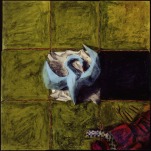Witch initially follows two timelines. In one, 14-year-old Liir is at sea after Dorothy kills Elphaba, so he accompanies Dorothy back to the Emerald City, where he attempts to find his old childhood playmate Nor. In another, set a decade later but introduced first, a traveling caravan finds the badly wounded adult Liir, and delivers him to the nuns who raised him and sheltered Elphaba in Wicked. As teenage Liir watches Oz's political order warp and shift following Elphaba's death and the Wizard's return to America, adult Liir slowly convalesces, and both question their parentage and their purpose as their stories coalesce.
By comparison with Maguire's debut novel Wicked, Son Of A Witch is less a dense, revelatory history, and more of an episodic, almost Candide-like fable. Though written with Maguire's characteristic dry, methodical attention to detail, it leaps from place to dissimilar place, presenting a fractured Oz that seems at every turn like a deeply frustrated allegory for current American politics. From the man who rides his family connections from a life of debauchery to a role as a self-appointed divine spokesman, down to the hidden jail where political prisoners are held without legal recourse, it all seems painfully familiar. And a metaphorical view certainly says interesting things about the character who started life as an elephant, became human to hide her true nature, and now wants to cast off the rotting remains of that false humanity so she can die in peace.
L. Frank Baum staunchly resisted allegorical interpretations of The Wizard Of Oz, and it's similarly possible to read Son Of A Witch simply as a colorful, compelling fantasy, though one grim almost to the point of nihilism. And perhaps that's the best way to read it, given Liir's faltering attempts to resist the erosion of his world's freedoms. His small victories feel honest rather than falsely cathartic, but they don't hold out much hope for more, for him or for what he represents.








































